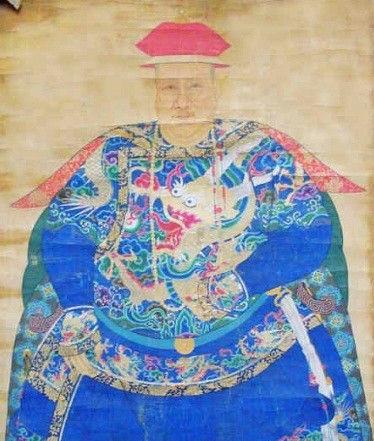What is history: it is the echo of the past to the future, the reflection of the future on the past. - Hugo
Wu Sangui, no one is familiar with him, he was a traitor in the late Ming and early Qing dynasties, surrendered to the Qing army at Shanhaiguan and defeated Li Zicheng in conjunction with the Qing army, and since then the Qing army has entered the customs and occupied the Central Plains. However, many people may not understand that after the death of the Chongzhen Emperor, Wu Sangui had once surrendered to Li Zicheng, rather than directly to the Qing Dynasty. Many people may think that Li Zicheng forced the death of the Chongzhen Emperor and was Wu Sangui's enemy of the king, so why did Wu Sangui choose to surrender to Li Zicheng? In fact, Wu Sangui has many reasons for doing this, and the following is listed for everyone.

Statue of Wu Sangui
First, Li Zicheng's Dashun regime is already the result of the public expectation, and unifying the world is the trend of the times. At that time, Li Zicheng had already occupied most of the world, with Hebei, Henan, Shanxi, Shaanxi, Gansu, and Huguang, and the morale of the Dashun army was high, and it took only more than two months to go from Xi'an to Beijing. After entering Beijing, the Ming officials in Beijing sharpened their heads and wanted to get an official position in the new Dashun government, so for Wu Sangui, who held military power, surrendering to Li Zicheng was to go with the trend.
Map of the situation in April 1644
Second, the founders and rulers of the Dashun regime were also Han Chinese, unlike the Qing Dynasty outside Guanwai, which was a foreign regime, which is called "changing the name of the surname, which is called the destruction of the country; benevolence and righteousness are full of congestion, and as for leading the beast to eat people." Man will eat each other, and the world will be destroyed. The protector of the country, his king and his subjects, the meat eaters plot; the one who protects the world, the lowly of the puppet, and the responsible ear! "The replacement of the Ming Dynasty by the Dashun regime is the subjugation of the country, and the subjugation of the country is something that the monarch needs to consider, for Wu Sangui, it is just a change of emperor, so the surrender of the Dashun regime has no psychological burden for Wu Sangui, nor does it need to bear the crime of national sinners." Moreover, if Li Zicheng surrendered, his generals and soldiers would not have any objections, and they would be more psychologically acceptable.
Third, the Guanliao Iron Horse led by Wu Sangui fought against the Qing army for a long time, and the two sides had formed many grievances, and it was unlikely that they would choose to cooperate with the Qing army without any pressure. And this point is also discussed in later historical materials, Wu Sangui "killed many times with Qing soldiers, did not want to return to his face, but repaired his cousin to return to Li Thief." However, Wu Sangui's troops did not have a direct confrontation with Li Zicheng's Dashun army, and combined with the second reason before, Li Zicheng's Dashun regime at that time was obviously superior to the Qing Dynasty's choice.
Qing army
Fourth, at that time, Wu Sangui was abroad to fight, but his parents and family were all in Beijing, and after Li Zicheng occupied Beijing, Wu's family was naturally under the control of Li Zicheng, although Li Zicheng treated the Wu family very favorably, but this was a compromise based on the situation in which Wu Sangui held a large army, and Li Zicheng did this to attract Wu Sangui. If Wu Sangui chooses to surrender to the Qing Dynasty and make enemies of the Dashun regime, then all the wu family members will become li Zicheng's hostages and risk being killed at any time. Later facts also proved this, after Wu Sangui surrendered to the Qing army, Li Zicheng suffered a crushing defeat at Shanhaiguan, and on the way back to Beijing, Li Zicheng ordered the killing of Wu Sangui's father, Wu Xiang. Therefore, in order to protect the family from being killed, surrendering to Li Zicheng is also the best choice.
Fifth, personal interests are the most important factor for Wu Sangui to consider. Before and after Li Zicheng entered Beijing, many Ming generals surrendered to Li Zicheng, and Li Zicheng did not hesitate to reward these generals. For example, Bai Guang'en, Jiang Ou, Tang Tong and others, when Tang Tong surrendered to Li Zicheng, there were only more than 10,000 people and horses, and Li Zicheng was named "DingXi Bo", while Wu Sangui held tens of thousands of troops, and was the strongest Fighting Force of the Ming Dynasty. Moreover, Tang Tong was also a lobbyist of Li Zicheng, "boasting of lily and praising himself as a lixian and appointing himself a prince as a father and son", and under such conditions, Wu Sangui chose Li Zicheng.
Lee Zi-cheng
Based on the above facts, Wu Sangui had enough reasons to choose to surrender to Li Zicheng, and Wu Sangui did exactly that. In the end, it was precisely these facts that deviated, and Li Zicheng's Dashun regime continued to carry out the "chasing after stolen goods and aiding wages" movement in Beijing, which damaged Wu Sangui's interests and made him doubtful about the promise of "father and son to be marquis", which also led to Wu Sangui choosing to rebel against Li Zicheng and surrender to the Qing Dynasty.